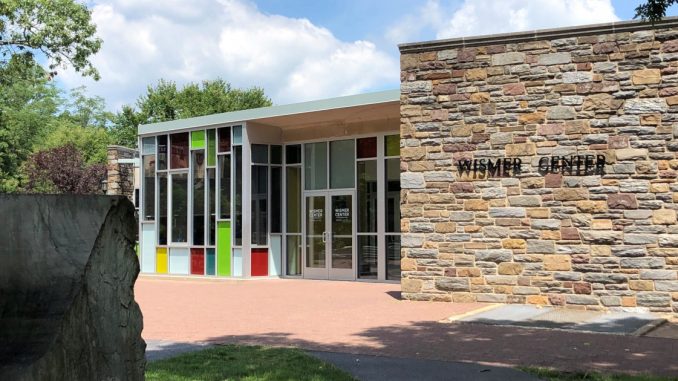
Chase Portaro (chportaro@ursinus.edu)
Routine trips to supermarkets and stockpiles of frozen pizzas — the drastic measures taken by school cafeterias across the country to feed students amid nationwide supply-chain disruptions and labor shortages caused by aftershocks of a global pandemic.
During the early stages of COVID-19, cafeterias like Wismer navigated a challenging terrain, keeping students and staff safe by implementing social distancing requirements and occupancy limits. While the arrival of vaccines reduces risk substantially for students and staffers alike, cafeterias still grapple with the pandemic’s consequences like the nationwide supply-chain disruptions and labor shortages. The White House recently released a statement blaming these issues on factory shutdowns, limited container availability, and vacant jobs in manufacturing and distribution — all byproducts of COVID-19.
Ursinus hasn’t resorted to outsourcing ingredients from supermarkets, but Director of Dining Services, Mike Forstoffer, still explains, “This year, only about 65% of ordered products are being fulfilled.” Compared to Forstoffer’s estimation of 98% fulfillment last year, the menu is naturally more limited. Along with meager supplies, Forstoffer also reports twenty-five available full-time positions.
Forstoffer posits, “These issues run the gamut. It’s nothing unique to Ursinus. Stores everywhere are having trouble stocking shelves and hiring employees.” His claim seems on course with The Bureau of Labor Statistics’ tally of 11 million jobs available nationwide. Jen Psaki, White House Press Secretary, further contextualizes, “Covid continues to be a threat to supply-chains.”
When asked how these national issues specifically affect jobs on campus, Forstoffer notes, “Many employees are working six days a week, making overtime, of course, but still, it takes a toll.” Lack of employees and inconsistent product shipments means employees are naturally tasked to do more with fewer resources.
According to Ursinus’s Dining webpage, due to national supply-chain and labor issues, Wismer is “experiencing frequent menu changes and substitutions for ingredients.” One student, who would like to remain anonymous said, “It’s harder to find stuff I want to eat compared to last year. Sometimes the food simply doesn’t taste good.”
Despite limited menus and perceptions of decreased quality, Forstoffer maintains Ursinus is doing everything possible to lessen the impacts of these transnational issues. As for inconsistent product shipments, he relates, “We’re working with our supply-chain partners; the problem is the distributors just don’t have product.” To fill vacant jobs, he says, “We’re also working with local employment agencies, and we’ve reached out directly to students through Handshake.” To keep students informed, he said “we have signs in Wismer about the supply-chain and labor issues.”
Staffers are working harder than ever to stay ahead of these issues. It’s no easy task because the root cause transcends Ursinus, but students can directly help by applying to jobs posted on Handshake where they “can come in a couple hours, make a couple bucks.” This is a great way to contribute to and improve a national crisis that affects staff and students alike. In the meantime, students can continue to be grateful for Wismer staffers’ dedication in keeping Ursinus students fed amid this national crisis.
